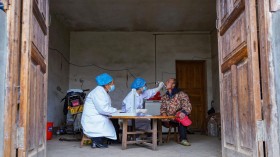Scientists have enlisted border collies to patrol our beaches and chase off seagulls infesting our waters with harmful E. coli bacteria.
Researchers behind a new study determined that sheep dogs were successful at keeping these bacteria-harboring gulls away from the seaside.
Gull dropping are known to be a source of E. coli bacteria, which can lead to abdominal cramping and diarrhea in humans, BBC News reported.
A recent report even showed that around a third of E. coli samples taken from the birds were resistant to more than one antibiotic.
The experiment was launched two years ago by researchers at Central Michigan University who were asked by the US Environmental Protection Agency to find new ways to control the rising numbers of gulls that gather on the shores of the Great Lakes, according to the Los Angeles Times.
In this new study, researchers assigned the dogs to 200-meter stretches of beach along the shores of Lake Michigan during the 2012-2013 summer seasons, while leaving two other nearby sections dog-free.
"They control very well," lead researcher and microbiologist Elizabeth Alm told the Los Angeles Times. "You just kind of point and say 'go' and they take off. Then they chase away the gulls and you whistle them back." Collies are known for their intelligence and herding abilities.
The researchers recorded the number of birds at each section of beach while water and sand samples were collected and tested for E. coli.
They found that the bacterial counts were significantly lower on those sandy parts where the dogs had kept the gulls at bay.
However, researchers discovered that later in the summer the bacteria counts went up once again, making Alm believe that the timing of the dog patrols is crucial.
"If the E. coli establish in the sand early in the season, they appear to be able to persist, and probably even grow in the sand so that even though the dogs can remove the gulls from the beach later in the season, this late reduction in gulls does not translate in to a late season reduction in E. coli," she said.
And don't worry; the dogs were given the opportunity to take care of their "business" before arriving on the job.
© 2024 NatureWorldNews.com All rights reserved. Do not reproduce without permission.



![Microplastics Escape Body's Gut to 'Infiltrate' the Brain, Kidneys and Liver [Study]](https://1471793142.rsc.cdn77.org/data/thumbs/full/70195/280/157/50/40/microplastics-escape-bodys-gut-to-infiltrate-the-brain-kidneys-and-liver-study.jpg)

